The Border Collie is recognized as one of the most intelligent and agile dogs in the world. This breed has long been appreciated for its exceptional herding skills. According to studies, the Border Collie can understand and memorize new commands in just a few repetitions, placing it at the top of the smartest dog breeds ranking.
Today, it is not only an outstanding working dog but also an ideal companion for active families and canine sports enthusiasts. Let’s discover everything you need to know about this exceptional breed!
Origins of the Border Collie #
The Border Collie originates from the border regions between England and Scotland, hence its name. Historically, it was selected for its endurance and ability to work long hours in difficult conditions. Its intelligence and natural herding instinct made it an indispensable working partner for shepherds. Through generations of rigorous selection, the Border Collie developed its intense gaze, also known as the “herding eye,” to control and direct flocks.
Physical Characteristics of the Border Collie #
The Border Collie is distinguished by its athletic appearance and intelligent expression. Its morphology is designed for agility and speed, making it particularly effective in canine sports.
Size and Weight #
The Border Collie is a medium-sized dog, well-proportioned, and with an athletic silhouette. Its morphology gives it both speed and endurance, essential qualities for a working dog!
| Sex | Height | Weight |
|---|---|---|
| Male | 19 - 22 inches | 31 - 44 pounds |
| Female | 18 - 21 inches | 26 - 40 pounds |
Coat Color #
The Border Collie’s coat can be of different colors, although black and white is the most common. Here are some variations:
- Black and white
- Blue merle
- Red merle
- Tricolor (black, white, and tan)
- Sable and white
The coat can be short or medium-length, often with a dense and water-resistant texture.
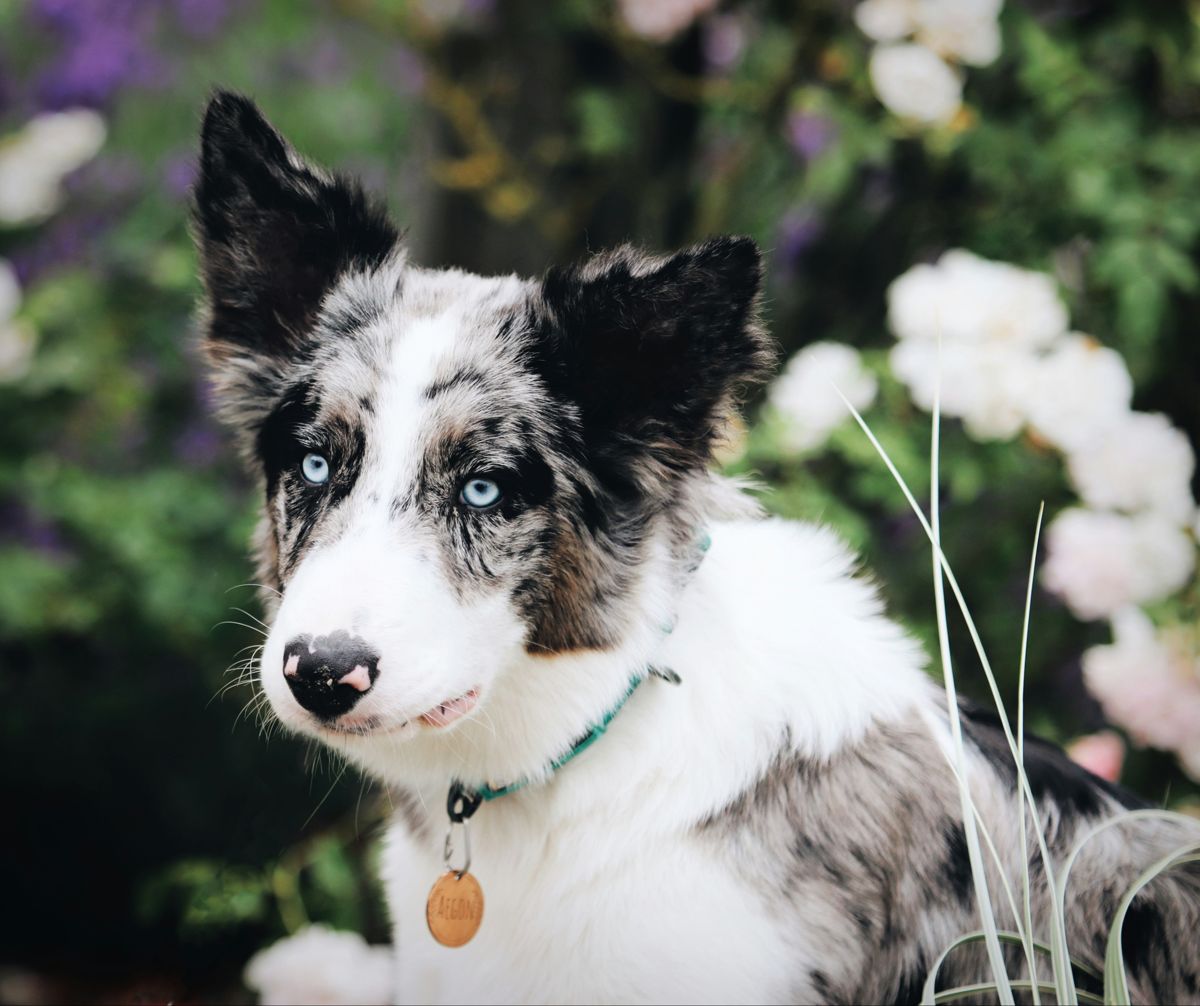
Specificities #
- Eyes: Border Collies are known for their intense and piercing gaze. Some may have heterochromia, with eyes of different colors (for example, one blue eye and one brown eye).
- Ears: Semi-erect or fully erect, their ears accentuate their lively and attentive expression.
- Gait: Their gait is fluid and graceful, a sign of their great agility and natural aptitude for running and working.
Behavior of the Border Collie #
The Border Collie is an extremely energetic, intelligent, and always ready to learn dog. It has been described as hyperactive and requires constant stimulation to avoid boredom.
Behavior with Children #
The Border Collie can be an excellent companion for children due to its loyal and protective nature. However, because of its herding instinct, it may sometimes try to “herd” children by following them closely or gently nipping at them. To avoid this behavior, it is recommended to:
- Socialize the Border Collie from a young age.
- Educate children on how to interact appropriately with the dog.
- Supervise play to ensure a safe and fun environment.
Behavior with Other Animals #
With other animals, the Border Collie can be reserved, especially if it has not been well socialized. Its natural instinct drives it to watch and herd, which can be misinterpreted by some pets.
It is therefore important to introduce your Border Collie to other animals from a young age. And it is also necessary to supervise initial interactions to avoid any undesirable behavior.
Health of the Border Collie #
Border Collies are generally healthy, but like all breeds, they are prone to certain diseases.
Life Expectancy #
A healthy Border Collie can live between 12 and 15 years. Its life expectancy is influenced by its genetics, diet, and the quality of care it receives throughout its life.
Common Diseases #
Here is a table of diseases to which the Border Collie may be prone:
| Disease | Description | Frequency |
|---|---|---|
| Progressive Retinal Atrophy (PRA) | Degeneration of the retina leading to vision loss. | High |
| Hip Dysplasia | Malformation of the hip joint, causing pain. | Medium |
| Epilepsy | Neurological disorders that can cause seizures. | Medium |
| Collie Eye Anomaly | Hereditary disorder affecting vision. | Low |
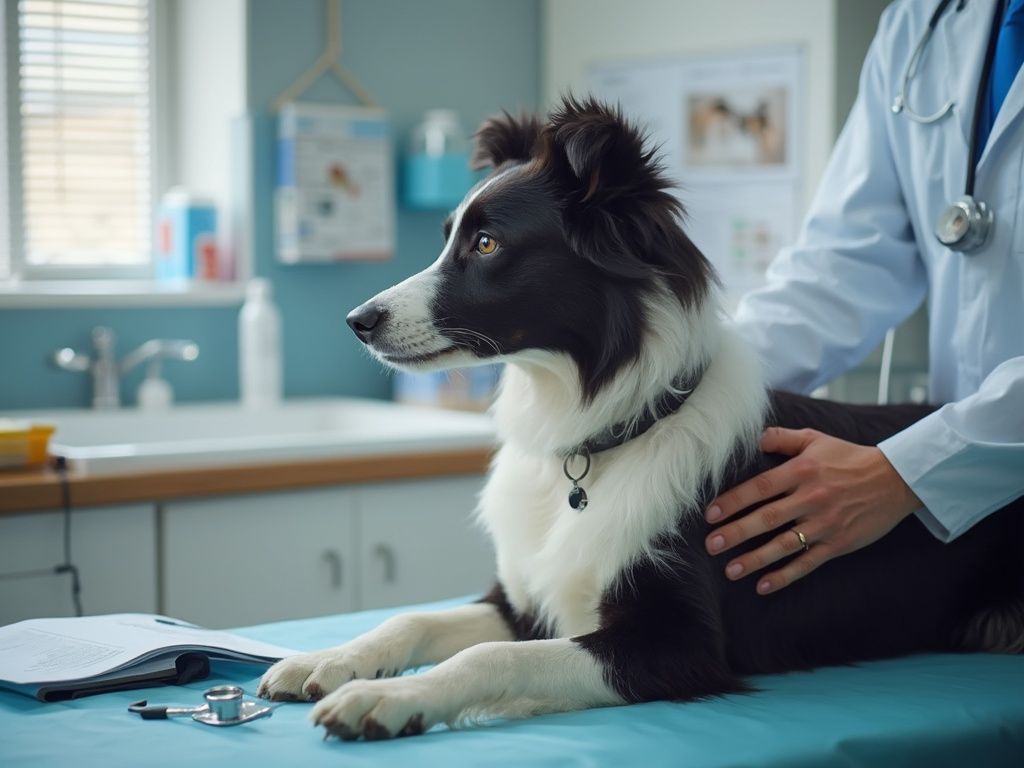
Heart and Respiratory Rates of the Border Collie #
Thanks to the many Border Collies equipped with Minitailz, we have recorded the following figures in non-sick dogs:
| Median Heart Rate | Median Respiratory Rate |
|---|---|
| 56.6 BPM 50% of them have a rate between 52.4 and 60.1 BPM |
17.1 RPM 50% of them have a rate between 15.1 and 19.5 RPM |
Training the Border Collie #
The Border Collie is one of the most intelligent dogs, making its training both rewarding and challenging. However, its high intelligence also means it gets bored easily. Proper training should include a variety of exercises and games to maintain its interest and prevent undesirable behaviors.
✔️ Positive Training Methods #
Border Collies respond extremely well to training methods based on positive reinforcement. This method involves rewarding desired behaviors, encouraging the dog to repeat them. Here are some tips for successful training:
- Food Rewards: Use small treats to motivate your Border Collie during training sessions. Vary the types of rewards to keep its interest.
- Toys and Games: Border Collies love games. Using a frisbee or ball as a reward can reinforce its desire to learn.
- Short and Varied Sessions: Keep training sessions short (5 to 10 minutes) and incorporate different activities to avoid monotony. This will help maintain its focus and accelerate learning.
It is important not to use punitive methods, as the Border Collie is sensitive and can develop anxiety if treated too strictly.
✔️ Importance of Early Socialization #
Early socialization is essential for the Border Collie to develop balanced behaviors and good self-confidence. From the age of 2 to 4 months, expose it to various environments, people, and animals. Here are some important points:
- Meetings with Other Dogs: Organize play sessions with well-socialized dogs so the Border Collie can learn canine codes.
- Exposure to Different Environments: Take it to parks, cities, forests, to get it used to different noises and stimuli.
- Interactions with Humans: Invite friends and family members so the puppy becomes familiar with different faces and voices.
Good socialization helps prevent aggressive or fearful behaviors in adulthood.
✔️ House Training #
House training is generally easy for the Border Collie due to its intelligence and desire to please. For effective results:
- Establish a Routine: Take the puppy out regularly, especially after meals, naps, and playtime.
- Immediate Reward: Praise and reward it as soon as it does its business outside. Positive association will reinforce this behavior.
- Supervision: Stay vigilant indoors and take it outside at the first signs of need (circling, sniffing).
Consistency and patience are key for the puppy to learn to be clean quickly.
✔️ Teaching Basic Commands #
The Border Collie learns basic commands with remarkable ease. Here are some tips for teaching the most common commands:
- Sit and Lie Down: Use a treat to guide the dog into the desired position, then reward it immediately.
- Stay: Start with short distances and gradually increase the duration of the exercise.
- Recall: The “come” command should be learned in a secure environment. Use an enthusiastic tone and rewards to encourage it to return to you.
❌ Managing Undesirable Behaviors #
Due to their intelligence and high energy level, Border Collies can develop some undesirable behaviors, especially if they are not sufficiently stimulated physically and mentally. Among the most common behaviors:
- Excessive Barking: The Border Collie may bark frequently if bored or if it detects unusual noises. To remedy this, ensure it is well-exercised and occupied. Train it to respond to a command like “quiet” to control barking.
- Chewing and Destruction: If the Border Collie does not find an outlet for its energy, it may attack furniture, shoes, or other household items. Offer it chew toys and search games to channel its energy positively.
- Chasing Vehicles or Joggers: Its herding instinct may sometimes drive it to chase anything that moves. To prevent this, teach it the commands “stop” and “stay.” Early socialization and regular exercise will also help reduce this behavior.
Training Exercise Examples #
Border Collies need mental as much as physical stimulation. Here are some examples of exercises suited to their energy level and intelligence:
- Agility: Obstacle courses are perfect for developing their agility and reinforcing their obedience skills.
- Advanced Obedience: Teach it complex commands, such as “spin” or “crawl,” to stimulate its mind.
- Tracking Games: Hiding objects and asking the dog to find them is an excellent way to work its sense of smell.
- Herding Training: If you have access to a flock of sheep, herding classes can allow it to fully exploit its natural instincts.
Character and Lifestyle of the Border Collie #
The Border Collie is a dog of impressive intelligence and energy. Its loyal and protective nature makes it an excellent companion for active families. However, its high activity level requires a lifestyle adapted to its needs.
Physical Activity and Exercise #
The Border Collie needs at least 2 hours of exercise per day to stay balanced. Insufficient activity can lead to the undesirable behaviors mentioned earlier or hyperactivity. To keep it effectively occupied:
- Canine Sports: Agility, flyball, and frisbee are excellent activities to channel its energy and stimulate its intelligence.
- Walks and Hikes: Vary the routes to maintain its interest and offer it a rich experience in stimuli.
- Interactive Games: Hiding toys or treats and asking it to find them is a mental activity that will help it expend energy.
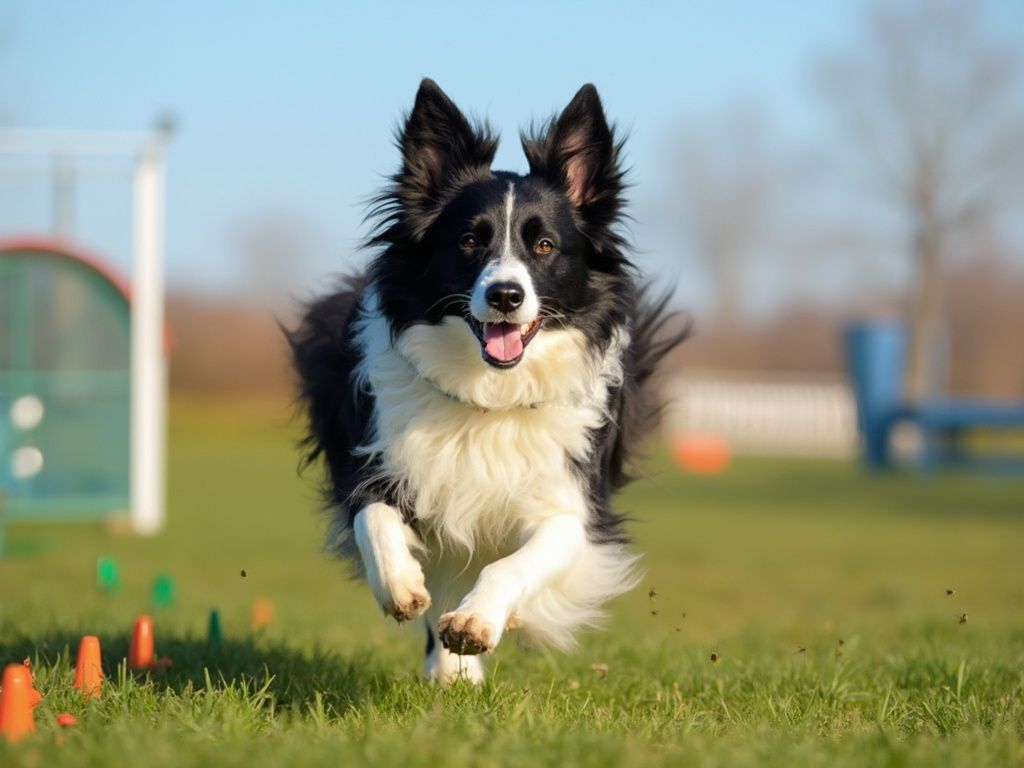
Indoor Character #
Indoors, the Border Collie can be calm and composed, provided it has been sufficiently exercised outdoors. Its intelligence makes it particularly sensitive to household routines. Some tips for managing its indoor behavior:
- Mental Stimulation: Offer it interactive toys or food puzzles to entertain it.
- Learning Limits: Teach it to stay on its mat or in a designated space when indoors to avoid it constantly following its owners.
A Loyal and Family-Oriented Dog #
The Border Collie is generally very attached to its family. It shows affection and devotion to its owners. However, it may sometimes try to “herd” family members, especially children, due to its herding instinct. To facilitate cohabitation:
- Training: Teach it basic commands to avoid undesirable behaviors such as nipping at heels.
- Family Games: Involve the whole family in games and activities, strengthening its bond with each member.
Living Environment #
The Border Collie thrives in an environment where it has enough space to expend energy. Here are some recommendations:
- House with Garden: Ideal for offering it moments of play and exercise outdoors.
- Nearby Green Spaces: If you live in an apartment, make sure you have access to parks or spaces where the dog can run freely.
- Indoor Occupation: If outdoor space is limited, offer it indoor activities to compensate, such as search games or obedience sessions.
Grooming and Hygiene of the Border Collie #
The Border Collie is a robust dog, but regular grooming is essential to ensure its health and well-being. Its coat, ears, teeth, and nails require specific care to keep it in good shape.
Brushing #
The frequency of brushing depends on the type of coat of the Border Collie. Short-haired Border Collies can be brushed 1 to 2 times a week to remove dead hair and dirt. Long-haired ones require daily brushing to prevent knots and tangles.
Use a soft-bristle brush for short coats and a wide-toothed comb for long and thick hair. During the shedding period, in spring and fall, brushing should be intensified to reduce the amount of hair falling in the house.
Baths #
A bath every 2 to 3 months is generally sufficient, unless the dog gets particularly dirty during outdoor walks. Use a shampoo specially formulated for dogs to preserve the natural texture of the coat and avoid skin irritations.
After the bath, make sure to dry the coat thoroughly, especially if it is long, to avoid any risk of skin infection due to moisture.
Ear Care #
The ears of the Border Collie should be checked and cleaned regularly. Due to their semi-erect shape, the ears can accumulate dirt and moisture, creating an environment conducive to infections. Use a gentle ear cleaner and a compress to clean the inside of the ears. Never insert objects into the ear canal to avoid any risk of injury!
Dental Hygiene #
Dental hygiene is just as important. Border Collies can be prone to tartar buildup, which can lead to periodontal diseases. Brush your Border Collie’s teeth 2 to 3 times a week with a toothbrush and toothpaste suitable for dogs. Dental treats and chew toys can also help maintain good oral health.
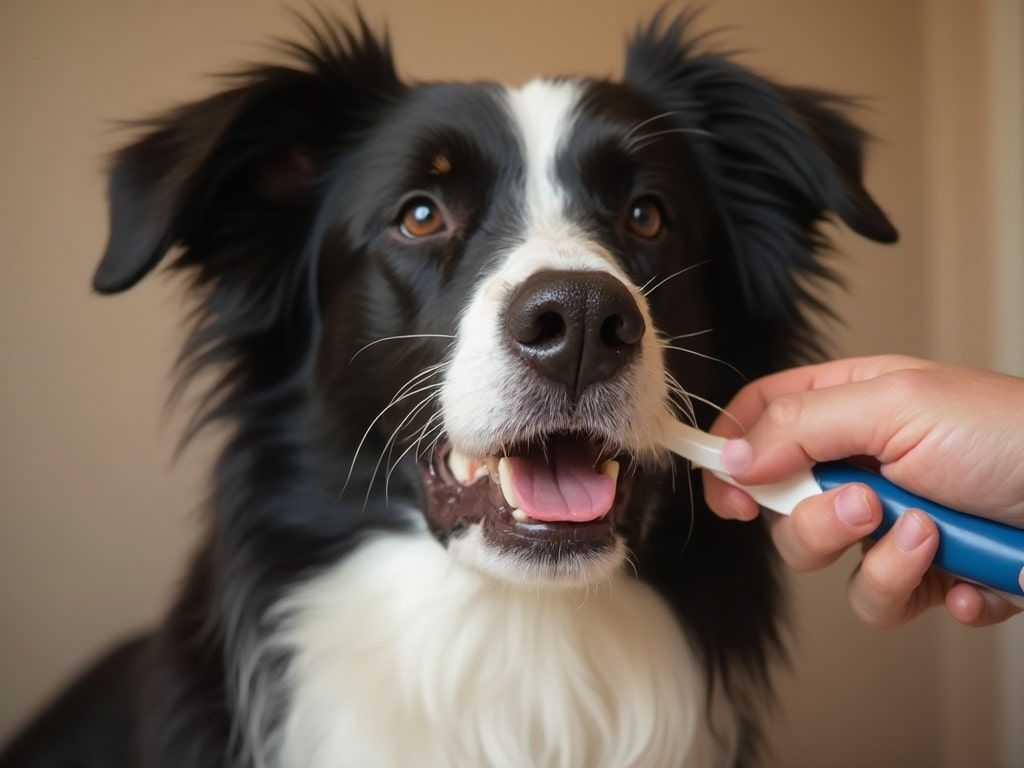
Nail Trimming #
The nails of the Border Collie should be trimmed regularly, usually every 3 to 4 weeks. Too long nails can hinder its gait and cause pain. If you are not comfortable trimming the nails yourself, seek the help of a professional groomer or your veterinarian.
Parasite Control #
Border Collies spend a lot of time outdoors, exposing them to parasites like fleas and ticks. Regularly inspect its coat after walks, especially after outings in wooded or grassy areas. Use suitable antiparasitic treatments, such as collars, pipettes, or tablets, to prevent infestations.
Diet #
The Border Collie needs a balanced diet to support its activity level and maintain good health. Favor a diet rich in quality proteins, which corresponds to its high energy needs.
- High-Quality Kibble: Choose kibble specially formulated for active dogs. They should contain a source of animal protein as the first ingredient, as well as essential fatty acids for a healthy coat.
- Divided Meals: Divide the food into two daily portions to facilitate digestion and avoid the risk of stomach torsion, to which some dogs are sensitive.
- Treats and Supplements: Treats can be used as rewards during training, but they should be given in moderation to avoid overweight. Dietary supplements, such as omega-3, can also be beneficial for long-haired dogs.
- Hydration: Ensure that your Border Collie always has access to fresh and clean water, especially after exercise.
The diet should be adapted to the age, weight, and physical activity of the Border Collie. Consult a veterinarian to establish a specific diet for your dog, to best meet its nutritional needs.
Adoption and Cost #
Adopting a Border Collie is a long-term commitment, both emotionally and financially. Before embarking, it is essential to be well-informed about the associated costs and the different ways to adopt this breed.
Adoption Price #
The cost of adopting a Border Collie varies depending on several factors, such as where you adopt it, its age, pedigree, and lineage.
- From a Breeder: If you wish to acquire a puppy from a professional breeder, the price can vary between 800€ and 1500€.
- In a Shelter: Adoption in a shelter or animal protection association is generally less expensive, with fees around 200€ to 500€.
When choosing to adopt from a breeder or shelter, take the time to do thorough research. Opt for a reputable breeder or shelter that cares for the well-being of the animals.
Annual Maintenance Cost #
The Border Collie is an active breed that requires quality food, regular veterinary care, and activities to expend energy. Here is an overview of the main costs to anticipate:
- Food: The Border Collie needs a protein-rich diet to support its activity level. On average, high-quality kibble costs around 500€ per year. This budget may increase if you opt for a specific diet, such as premium kibble or a BARF diet (raw food).
- Veterinary Care: Veterinary expenses include vaccines, antiparasitic treatments, regular consultations, and possibly sterilization. On average, plan an annual budget of 300€ to 600€ for routine care. It is recommended to subscribe to dog health insurance to cover potential costs related to accidents or illnesses, which may represent an additional monthly cost.
- Accessories: Upon adoption, it is important to purchase necessary accessories, such as a leash, collar, bowls, bed, toys, and grooming items. The initial cost for these accessories can vary between 100€ and 200€. Additionally, there are occasional expenses for renewing toys or damaged accessories.
- Training and Activities: The Border Collie needs mental and physical stimulation. Participating in training classes, canine sports activities (like agility), or specific training can incur additional costs. Canine training classes can cost between 10€ and 30€ per session, and registration for sports activities may vary depending on clubs and levels.
Ultimately, the annual cost to maintain a Border Collie can range between 800€ and 1200€, or more depending on the dog’s individual needs. It is therefore essential to plan this budget and ensure that you have the necessary resources to offer your Border Collie a happy and healthy life.
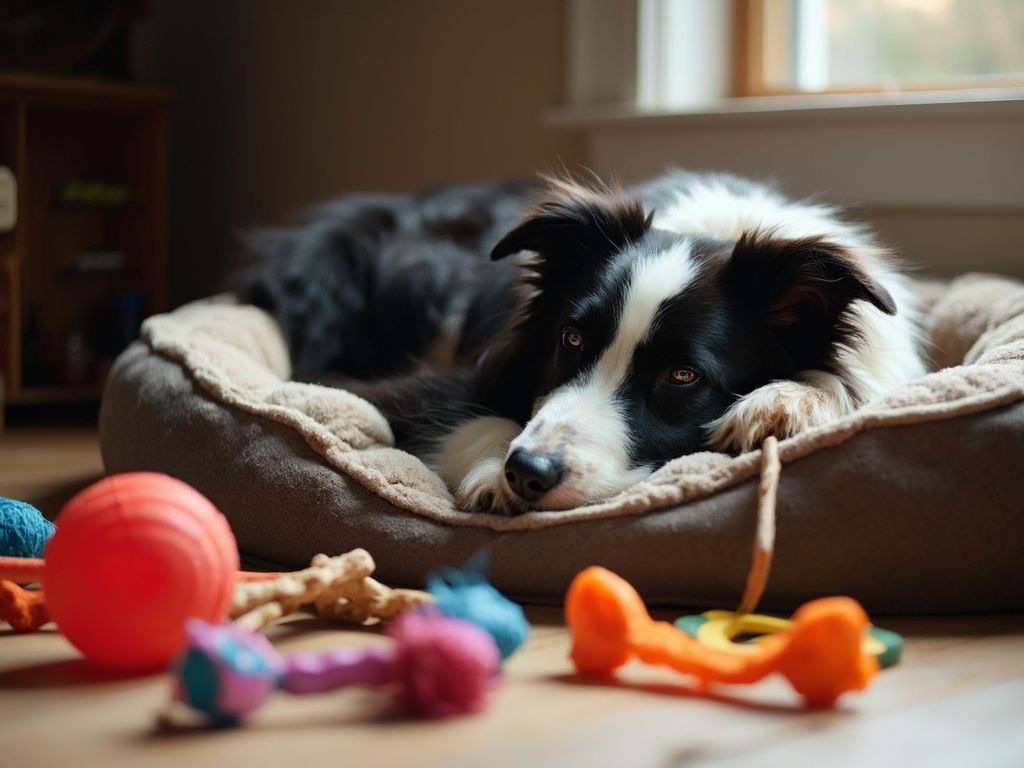
The Border Collie is an exceptional dog, both intelligent, energetic, and loyal. Its training and lifestyle require significant commitment to meet its physical and mental needs. However, for active families ready to offer it exercise, games, and lots of attention, the Border Collie is a faithful and loving companion that will enrich its owners’ lives in countless ways!

